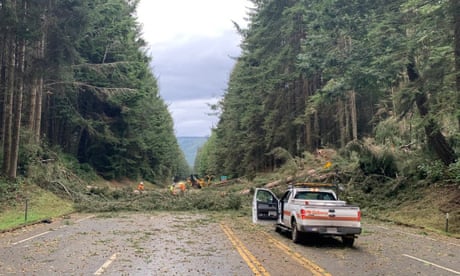- by foxnews
- 05 Mar 2025
Two dead as ‘bomb cyclone’ brings heavy winds and rain to California
Two dead as ‘bomb cyclone’ brings heavy winds and rain to California
- by theguardian
- 06 Jan 2023
- in news

It has been a deadly and destructive start to the year in California, as a series of severe storms slammed the state this week, toppling trees, submerging streets and sending water cascading into homes and businesses.
The latest storm hit hard on Thursday - a powerful "atmospheric river" that brought with it damaging winds and torrents of rain. At least two deaths have been reported in connection with the latest storm, including a child whose home was hit by a falling tree in Sonoma county. By Thursday morning, more than 163,500 people were without power, with little reprieve in sight.
The downpour is the latest of three atmospheric rivers to pummel the drought-stricken state, spurred by a bomb cyclone that drew the long plumes of moisture from across the Pacific.
The rain event left considerable damage in its wake as the saturated soils and inundated systems struggled to contain several consecutive deluges. Trees and infrastructure were rocked by heavy winds, while strewn debris and rock slides closed highways and roads in several areas. Gusts topped 100 mph in some parts of the state as waves churned to historic heights, surging up to 60ft in Point Reyes. Flood watches covered a staggering 90% of California's population - 35 million people - on Thursday.
"Considerable flooding impacts are likely on Thursday," the National Weather Service warned in a forecast discussion, noting that the incoming downpour could produce over 1in of rain an hour in some areas and lead "to rapid water rises and mud/rock slides".
The new wave of destruction comes as the US west coast reels from a downpour over the New Year's Eve weekend, which gave San Francisco its second wettest day on record and caused widespread flooding and damage. Officials are still recovering bodies in submerged vehicles in Sacramento county along a highway that flooded during the weekend storms.
California's governor, Gavin Newsom, has declared a state of emergency to allow for a quick response and to aid in cleanup. "We anticipate that this may be one of the most challenging and impactful series of storms to touch down in California in the last five years," said Nancy Ward, director of the California governor's office of emergency services.
As the rains engorged streams and swallowed piers, whipping up waves dozens of feet high along the coast, evacuations were ordered in several towns across the state. Residents near burn scars and unhoused communities that congregated along riverbanks were told to relocate as the storm threatened to unleash debris flows and flooding.
Among the towns ordered to evacuate was Montecito, where five years ago huge boulders, mud and debris swept down mountains through the town to the shoreline, killing 23 people and destroying more than 100 homes.
Elsewhere, a 45-mile (72km) stretch of the coastal Highway 1 running through Big Sur was closed on Wednesday evening in anticipation of flooding and rock falls. Farther north, a 25-mile stretch of Highway 101 was closed due to several downed trees. Drivers were urged to stay off the roads unless absolutely necessary, especially with heavy snow expected in the mountains.
San Francisco's mayor, London Breed, said at a news conference that the city was "preparing for a war". Crews cleared clogged storm drains, tried to move homeless people into shelters and passed out emergency supplies and ponchos to those who declined to go.
The city distributed so many sandbags to residents that supplies temporarily ran out.
Powerful winds gusting to 85mph (136km/h) or more forced the cancellation of more than 70 flights at San Francisco international airport and downed trees and power lines. Firefighters rescued a family after a tree fell on to their car. The fire department reported "large pieces of glass" fell off the Fox Plaza tower near the Civic Center, although no injuries were reported. It was "highly possible" the damage was wind-related, the department tweeted.
Atmospheric rivers, named by researchers in the 1990s, occur globally but are especially significant on the US west coast, where they create 30% to 50% of annual precipitation, according to the National Oceanic and Atmospheric Administration.
It's not unusual for California to get a strong storm during the early months of the year, and a wet winter is certainly welcome across the parched landscapes. But severe deluges do less to help quell drought conditions than more moderate rains spread across the season.
The weather whiplash may also result in more damage, as the hardened ground and stressed vegetation is less equipped to withstand the shift in conditions.
"The rainwater runs right off - it doesn't soak in," said Alison Bridger, a professor of meteorology and climate science at San Jose State University, adding that "the drought has weakened the trees and it makes it that much easier to have them come down if the ground is very soft and if you have strong winds come along".
The storms have delivered a hopeful dump of snow at higher elevations with more expected in the coming days. The snowpack, which serves as a water savings account of sorts that melts into streams, rivers, and reservoirs for use during drier times, stood at 174% of average even before the latest storm.
But, "we really don't want a deluge of rain and we don't want a drizzle", Bridger said, noting that drought conditions can't be overcome with just one wet season. Still, these rains will offer some reprieve for declining reservoirs. "I think we could put a good dent in the drought situation by having more or less continuous rain for three weeks," she said. "I think we would all love to see the reservoirs brimming by the end of the season."
The Associated Press contributed to this report
- by foxnews
- descember 09, 2016
Popular travel destination breaks annual tourism record, sets new goal of 60M visitors
After breaking an annual tourism record in 2024, Japan looks to reach 60 million visitors by 2030. Officials tell Fox News Digital how Japan plans to attract visitors.
read more


